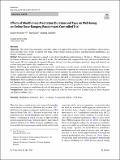Files in this item
Effects of mindfulness meditation duration and type on well‑being : an online dose‑ranging randomized controlled trial
Item metadata
| dc.contributor.author | Fincham, Guy W. | |
| dc.contributor.author | Mavor, Ken | |
| dc.contributor.author | Dritschel, Barbara | |
| dc.date.accessioned | 2023-04-21T14:30:09Z | |
| dc.date.available | 2023-04-21T14:30:09Z | |
| dc.date.issued | 2023-05-01 | |
| dc.identifier | 284382715 | |
| dc.identifier | 379f0011-a1c5-4473-8ce8-d56d39d79ae3 | |
| dc.identifier | 85152371931 | |
| dc.identifier.citation | Fincham , G W , Mavor , K & Dritschel , B 2023 , ' Effects of mindfulness meditation duration and type on well‑being : an online dose‑ranging randomized controlled trial ' , Mindfulness , vol. 14 , pp. 1171-1182 . https://doi.org/10.1007/s12671-023-02119-2 | en |
| dc.identifier.issn | 1868-8527 | |
| dc.identifier.other | ORCID: /0000-0002-0909-6323/work/133728945 | |
| dc.identifier.other | ORCID: /0000-0002-3160-3889/work/133736690 | |
| dc.identifier.uri | https://hdl.handle.net/10023/27456 | |
| dc.description | Funding: Open access funding provided by University of Sussex. GWF has a doctoral scholarship from, and is a fellow of, The Ryoichi Sasakawa Young Leaders Fellowship Fund, Sylff Association, Tokyo. | en |
| dc.description.abstract | Objectives This multi-arm randomized controlled online trial explored the effects of two key mindfulness characteristics (dose and type) over 2 weeks on mental well-being, along with psychological distress and dispositional mindfulness, in a healthy community sample. Method Participants were randomly assigned to one of four mindfulness interventions (~ 10 min or ~ 30 min of sitting or movement meditation) to practice daily for 2 weeks; 161 participants fully completed the study and were included in the final sample. We also explored self-reported adherence through how often participants practiced, along with dropout rate via how many participants fully completed the study. Results Well-being and mindfulness scores increased—and distress scores decreased—within all four conditions. However, most importantly, there were no significant differences between the conditions as a function of meditation dose or type. There were also no differences between the conditions on how regularly the meditations were practiced irrespective of type or dose. Additionally, there was no difference on dropout rate regarding meditation dose. However, meditation type had an effect, with a significantly higher dropout rate for participants allocated to a movement meditation irrespective of the dose. Conclusions Brief mindfulness meditation may offer some benefit to well-being regardless of the meditation type and dose but, fundamentally, no differences in effects were detected between short/long sitting meditations and short/long movement meditations. Moreover, the results indicate that movement meditations may possibly be harder to adhere to, potentially informing the tailoring of mindfulness-based self-help programs. Limitations and future directions are also discussed. Preregistration This study was retrospectively registered with the Australian New Zealand Clinical Trials Registry (ACTRN12619000422123). | |
| dc.format.extent | 12 | |
| dc.format.extent | 999024 | |
| dc.language.iso | eng | |
| dc.relation.ispartof | Mindfulness | en |
| dc.subject | Mindfulness meditation | en |
| dc.subject | Dose | en |
| dc.subject | Technique | en |
| dc.subject | Component analysis | en |
| dc.subject | Well-being | en |
| dc.subject | BF Psychology | en |
| dc.subject | NDAS | en |
| dc.subject | MCC | en |
| dc.subject.lcc | BF | en |
| dc.title | Effects of mindfulness meditation duration and type on well‑being : an online dose‑ranging randomized controlled trial | en |
| dc.type | Journal article | en |
| dc.contributor.institution | University of St Andrews. School of Psychology and Neuroscience | en |
| dc.contributor.institution | University of St Andrews. Institute of Behavioural and Neural Sciences | en |
| dc.identifier.doi | 10.1007/s12671-023-02119-2 | |
| dc.description.status | Peer reviewed | en |
This item appears in the following Collection(s)
Items in the St Andrews Research Repository are protected by copyright, with all rights reserved, unless otherwise indicated.

